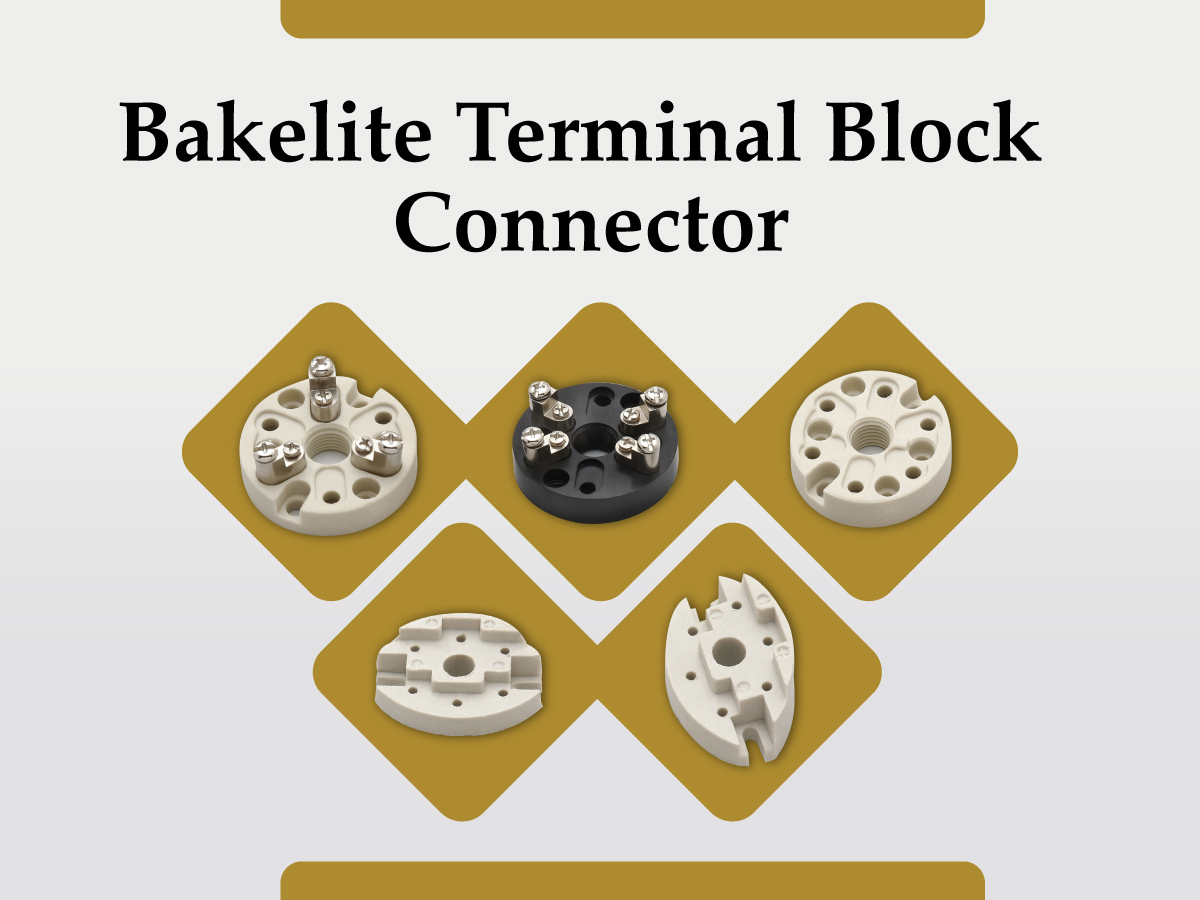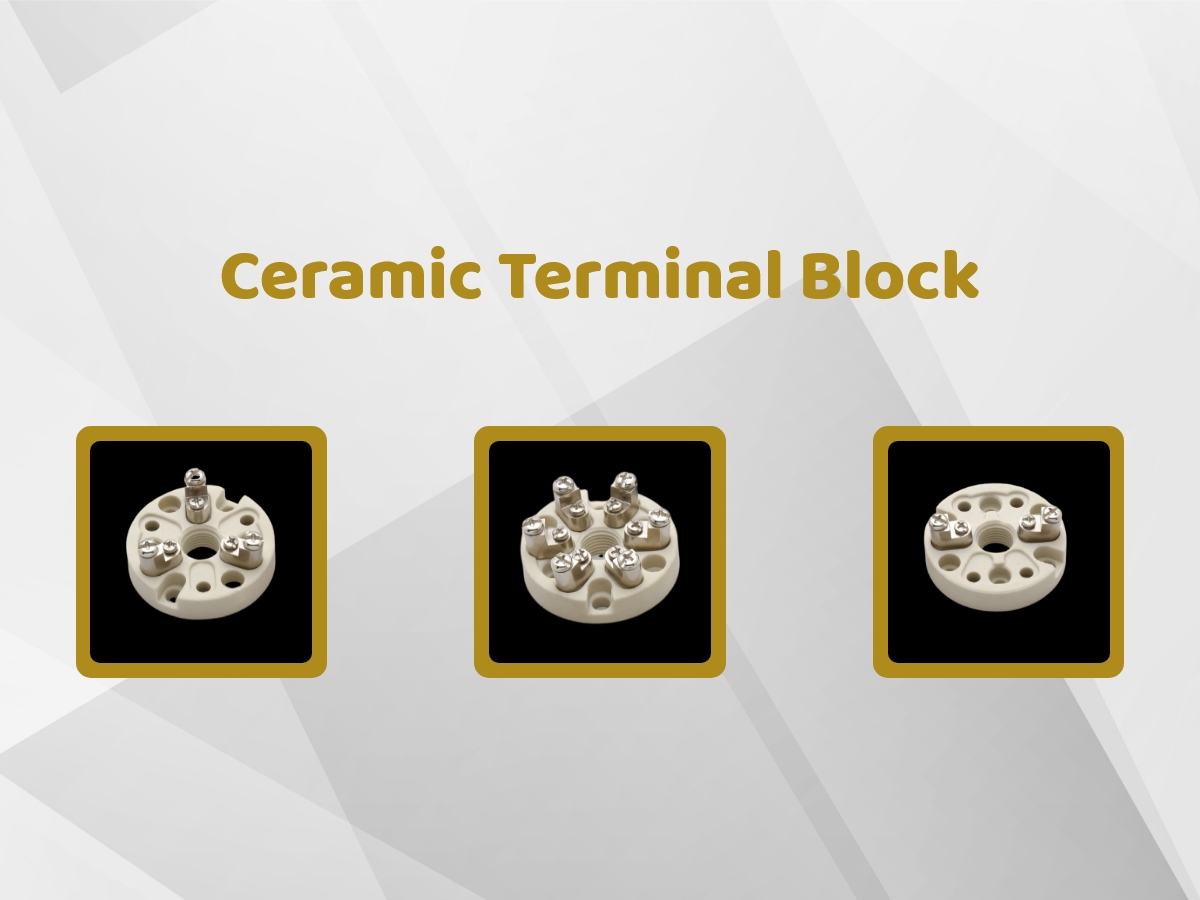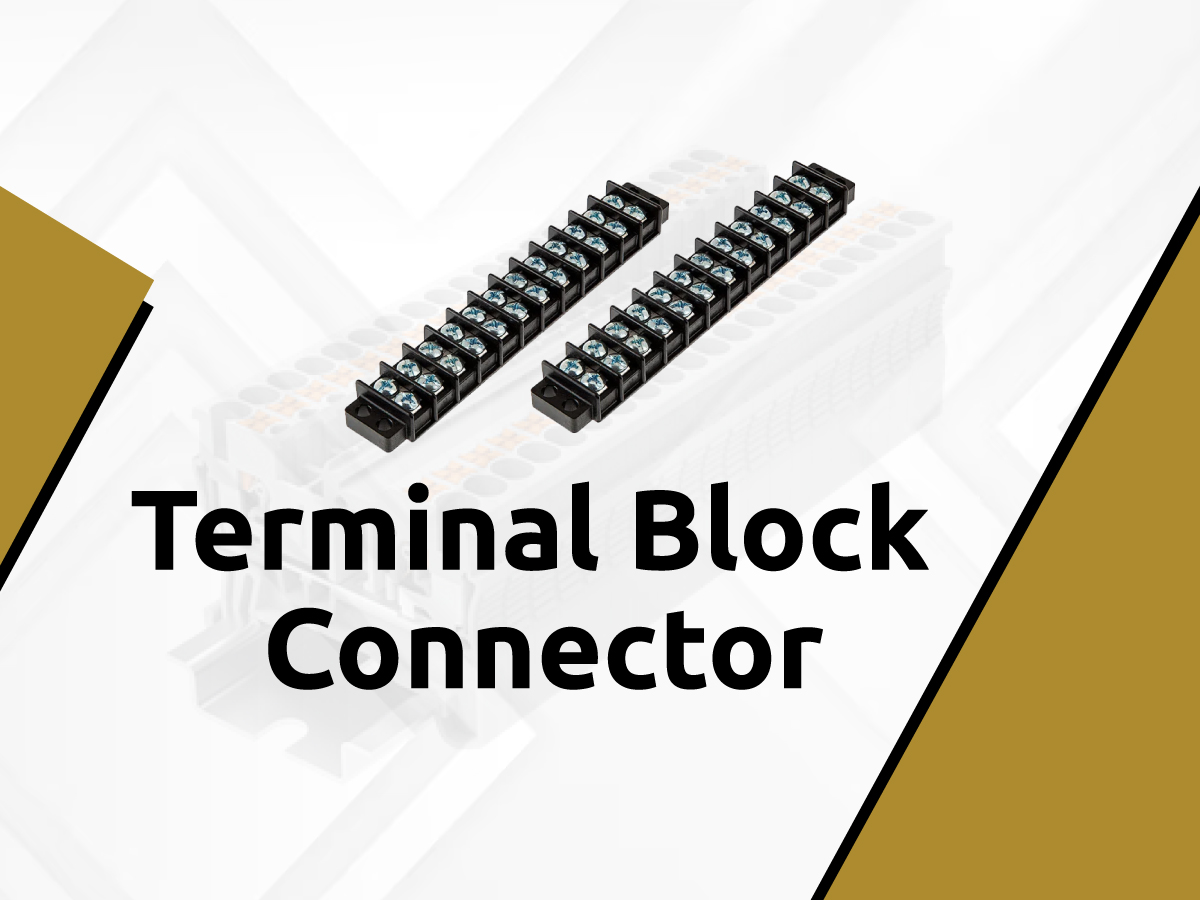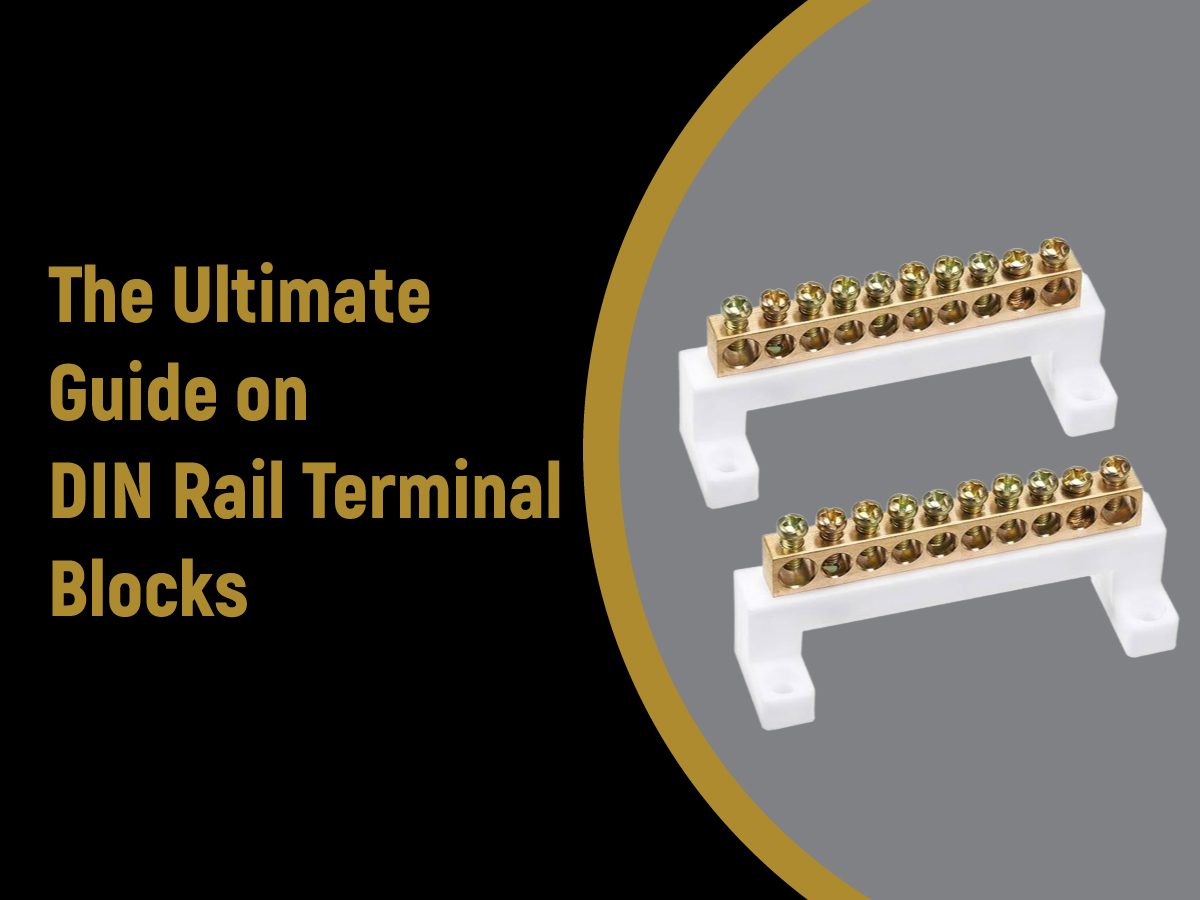- Home >
- category >
- Terminal Blocks >
Teron Metal Components News & Events
Explore the latest blog and news on metal components, electrical components, earthing components, fasteners, custom manufacturing solutions, industrial solutions, latest industrial trends, and more!
Categories
Archives
What you should know about Bakelite Terminal Block?

Do you have a wiring project that requires a reliable connection? If so, a Bakelite terminal block is the ideal solution. With its secure connections and corrosion resistance, a Bakelite terminal block is a reliable and economical way to wire a variety of systems.
In this blog post, we will provide an overview of what is Bakelite terminal block, types of Bakelite terminal block, its features, and applications. So, if you are looking for a durable and cost-effective wiring solution, read on to learn all you need to know about using a brass terminal block.
Here, you will gain a better understanding of use Bakelite terminal block to ensure a secure connection and extend the lifespan of any electric wiring project.
What is Bakelite Terminal Block?
A Bakelite terminal block is an electrical component / connector used for making secure electrical connection connections is an electrical circuit. These types of terminal blocks are made of Bakelite, a Phenolic resin known for its electrical non-conductivity and heat-resistant properties. Bakelite is a type of thermosetting plastic that was one of the earliest synthetic plastics used for industrial purposes.
Here are some types of Bakelite Terminal Blocks:
Types of Bakelite Terminal Blocks
Bakelite terminal blocks can be classified according to their structure, power rating, and termination options, including Bakelite 2-way Connector, Bakelite 3-way Connector, Bakelite 4-way Connector, Bakelite 5-way Connector, 15 AMP Open Bakelite Connector, 60 AMP Close Bakelite Connector, Bakelite Wire Connector, Bakelite Connector Strip, etc.
Features of Bakelite Terminal Blocks
- Insulation: It provides excellent electrical insulation, preventing electrical leakage and enhancing safety.
- Heat Resistance: It can withstand high temperatures, making it suitable for high-power applications and environments with significant heat exposure.
- Durability: Resistant to moisture, chemicals, and mechanical wear, ensuring longevity and reliability.
- Modular Design: Typically, these terminal blocks are designed in a modular fashion, allowing for easy addition or removal of sections based on the needs of the electrical circuit.
- Screw Terminals: Bakelite terminal blocks feature captive screw terminals, providing a secure and stable connection for wires.
- Mechanical Strength: Bakelite terminal blocks offer good mechanical strength, ensuring they can withstand the stresses and strains associated with connecting and disconnecting wires.
- Chemical Resistance: Bakelite is resistant to many chemicals, oils, and solvents, which adds to its durability and reliability in various environments.
- Corrosion Resistance: Bakelite is inherently corrosion-resistant, which helps prevent rust or corrosion from affecting the terminal block’s performance.
- Reusable: Bakelite terminal blocks / strips structural integrity, allowing the block / strip to be reused multiple times.
- Easy Installation: Terminal blocks made from Bakelite are often designed for easy installation, with features such as screw terminals or push-in connectors for quick and secure wire connections.
- Customization: Bakelite terminal blocks can be manufactured in various shapes, sizes, and configurations to meet specific application requirements. This includes options for different numbers of terminals, mounting options, and wire entry/exit points. When it comes to custom Bakelite terminal block / connector, need to find a reliable terminal block manufacturer.
- Cost-Effective: Bakelite is relatively inexpensive compared to other materials used for terminal blocks, making it a cost-effective option for many applications.
Considerations for the Use of Bakelite Terminal Blocks
Current and Voltage Ratings: Ensure the terminal block can handle the electrical load of your application.
Size and Configuration: Select the appropriate size and configuration to fit the available space and number of connections needed.
Quality: Choose high-quality Bakelite terminal blocks from reputable terminal blocks supplier to ensure maximum safety and performance.
Applications of Bakelite Terminal Blocks
Electrical Application:
Found in various industrial applications, such as control panels, automation systems, and electrical distribution boards.
Wiring Applications:
Used extensively to manage wiring in residential, commercial, and industrial buildings.
Automotive Industry:
Provides reliable connections in various automotive electrical systems.
Industrial Machinery and Equipment:
Commonly used in Industrial equipment such as wired support boxes, industrial lights, blowers, power distribution, variable speed/ frequency drives, and control boxes.
Consumer Electronics:
Found in various electronic devices where stable and reliable electrical connections are essential.
Electrical Equipment and System:
Used in small control panels transformer, rectifier, instruments.
Home appliances:
Used like uninterrupted power supplies for inverters, stabilizers, Air conditioner, electric stoves and ovens, toaster, washing machine and dryer, vacuum cleaner, and electric heaters.
Count on Us for High Quality Bakelite Terminal Blocks
Bakelite terminal blocks are a reliable and safe option for various electrical applications due to their characteristics. By understanding their features, applications, benefits, and proper usage considerations, you can effectively utilize Bakelite terminal blocks in your electrical projects.
Teron Metal Components is an ISO 9001:2015 certified leading manufacturer and exporter of Bakelite terminal blocks. Besides offering custom and contract manufacturing for special industrial applications, we also offer OEM manufacturing services. We are well known in the global marketplace for our quality products and cost-effective services. To know more about our services and products, you can contact us at sales@teronmetalcomponents.com or request a quick quote.
A Complete Guide for Purchasing Ceramic Terminal Block

A ceramic terminal block enables secure connections and efficient power distribution when it comes to electrical wiring and connections. However, navigating the diverse array of options available in the market requires a comprehensive understanding of their specifications, features, and applications.
Whether for panel wiring, power distribution, industrial machinery, building wiring, field wiring, telecommunications, renewable energy systems, automotive systems, or consumer electronics, selecting the right ceramic terminal block is crucial for ensuring reliability, safety, and optimal performance in myriad electrical installations.
This guide aims to provide clarity by delineating key considerations and offering practical insights for purchasing ceramic terminal blocks tailored to specific needs and requirements.
YOU MAY ALSO LIKE: Purchase Wholesale Terminal Blocks
Ceramic Terminal Blocks:
Ceramic terminal blocks are electrical connectors that are made from ceramic materials known for their high-temperature resistance, electrical insulation properties, and durability. They are used to secure and terminate electrical wires in electrical devices for industry and domestic applications. In industry, they are used in high-temperature applications like furnaces, heaters, process equipment and machinery.
Ceramic terminal blocks come in various shapes, sizes, and configurations to accommodate different wiring needs and environments. Ceramic terminal blocks type SL allow the use of all cable termination ends, good visualization of the insertion of conductors (as ring and fork terminals) and long saddle tab to avoid conductor shearing.
When it comes to purchasing ceramic terminal blocks for specific applications, there are several key factors that should be considered to ensure the right one.
Here are the essential factors to keep in mind:
- Voltage and Current Ratings: Determine the voltage and current requirements of your application. Ceramic terminal blocks come with specific voltage and current ratings, and exceeding these limits can lead to electrical hazards or component failure. Ensure that the terminal blocks you choose can handle the expected voltage and current levels safely.
- Temperature Rating: Consider the operating temperature range of the environment where the terminal blocks will be installed. Ceramic terminal blocks typically have high temperature resistance compared to plastic counterparts, but it’s essential to verify that they can withstand the temperatures present in your application without degradation.
- Wire Size Compatibility: Check and ensure the wire size compatibility. Ensure that the selected ceramic terminal block can accommodate the diameter of the wires to use without causing stress or damage to the wires.
- Mounting Options: Evaluate the mounting options available for the ceramic terminal blocks. Depending on the application, terminal blocks can be mounted on DIN rails, panels, or directly onto a PCB (Printed Circuit Board). Select ceramic terminal blocks with mounting features that are compatible with your installation setup.
- Number of Poles: Based on requirement, determine the number of poles. Ceramic terminal blocks are available in various configurations, including single, double, or multiple poles. Select ceramic terminal blocks with the appropriate number of poles to accommodate the required connections.
- Cost and Availability: Compare prices from different suppliers and manufacturers. Also, consider factors such as quality and turnaround time. Choose a reliable ceramic terminal block manufacturer or supplier who can provide consistent quality and timely delivery of terminal blocks.
YOU MAY ALSO LIKE: How to choose a custom terminal block manufacturer?
Benefits of Ceramic Terminal Blocks:
- Temperature Resistance: They are designed to withstand high temperatures, typically ranging from several hundred degrees Celsius, contingent upon the specific ceramic material employed.
- Electrical Insulation: Ceramic materials exhibit good electrical insulation properties, rendering them ideal for high-voltage applications. High-temperature ceramic terminal blocks are the most suitable to provide reliable electrical insulation to prevent short-circuiting and other electrical failures.
- Corrosion Resistance: Ceramic materials are highly corrosion resistant. This characteristic makes them suitable for use in harsh environments.
- Thermal Conductivity: They have specific thermal conductivity properties for efficient heat transfer. It has been shown that efficient heat transfer can increase energy efficiency by up to 20% in high-temperature applications.
- Mounting Options: They offer various mounting options, including screw connections, bolted connections, or clamps, catering to diverse installation requirements.
- Customization: They can be tailored to fulfill specific application needs, encompassing diverse pin configurations, sizes, and shapes, thus ensuring seamless integration with the electrical system in which they are deployed.
YOU MAY ALSO LIKE: Select Reliable Terminal Block Supplier
Apart from the above, numerous factors and advantages of ceramic terminal blocks contribute to the decision-making process when selecting and purchasing the most suitable ones. Selecting the right ceramic terminal block is essential for every application either industrial or commercial. Invest in high-quality ceramic terminal blocks from reputable manufacturers to ensure optimal performance.
Teron Metal Components is an ISO 9001:2015 certified leading manufacturer and exporter of ceramic terminal blocks. Besides offering custom and contract manufacturing for special industrial applications, we also offer OEM manufacturing services. We are well known in the global marketplace for our quality products and cost-effective services. To know more about our services and products, you can contact us at sales@teronmetalcomponents.com or request a quick quote.
Terminal Block Connector: Its importance, types, and uses.

What is Terminal Block Connector?
Terminal block connector (also known as terminal connector, terminal block, connection terminal) is type of electrical connector that are intended to safely and effectively connect wires and cables. This versatile component is used in various industries and applications, offering a reliable solution for managing electrical connections.
In this article, we will explore the importance of terminal block connectors, delve into their types, and highlight their diverse uses.
Importance of Terminal Block Connector:
How do we connect two wires? What if the insulation is stripped at the ends and they are twisted together? Yes, it’s effective. Can it be considered safe? The joint can be covered with insulation tape, or a wire connector can be used. How about when there are multiple wires that need to be joined or connected near each other? Or, what if multiple outgoing wires are connected to a single incoming wire? This method will no longer be safe or convenient. Here we use a terminal block connector.
The importance of terminal block connectors lies in their ability to streamline wiring, reduce the risk of short circuits or loose connections, and facilitate the organized routing of cables. They provide a stable and secure platform for connecting wires, which is vital for ensuring the integrity and safety of electrical circuits. Additionally, terminal blocks offer flexibility in configuration, making it simpler to modify or expand electrical systems without the need for extensive rewiring. Overall, the efficiency, reliability, and adaptability of terminal block connectors contribute significantly to the overall functionality and safety of electrical installations.
Types of Terminal Block Connector:
There are several types of electrical terminal block connectors, depending on their structure, device type, and termination options.
Classified Terminal Block Connector Based on Structure Type:
Pass-Through Terminal Block Connector:
It is also known as a single wire terminal block or wire-to-wire connection or single-feed terminal blocks. Whenever there is only one input and one output contact on a terminal block.
Dual Strip Terminal Block Connector:
These terminal block connectors have more than one connection strip for wiring. It is generally used to save space and simplifies wiring.
Multi Strip Terminal Block Connector:
There is an extra strip line for multiple connections, same as dual-strip terminal block connectors. Multi-strip terminal block connectors also known as bridge terminal block connector.
Classified Terminal Block Connector Based on Device Type:
Ground Terminal Block Connector:
There are multiple wiring options and a metal base that makes it perfect for grounding wires.
Disconnect Terminal Block Connector:
This terminal block connector allows wires to be easily disconnected. It is ideal for applications where hot-swapping or easy removal of connections is essential.
Power Distribution Terminal Block Connector:
These terminal block connectors are used in electrical power distribution. A power distribution terminal block distributes power from a single input source to multiple outputs in a convenient, economical, and safe manner. There are multiple output terminals provided at the output of the block, and one large wire is connected to its input terminal. In this way, wires are neatly arranged in a control panel, creating a professional appearance.
Classified Terminal Block Connector Based on Connection method:
Screw-in Terminal Block Connector:
A screw-in terminal block connector is probably the most common and popular connection method of wire termination. Those terminal blocks that use screws to hold wires are screw-in terminal blocks. It offers distinct advantages such as its suitable for most kind of wires, easily install/connect without any special tool, can disconnect using with the aid of an ordinary.
Barrier Terminal Block Connector:
These are very similar to screw terminals in that they use screws as the mechanism to hold cables. Barrier terminal blocks often have more than one termination point for multiple cables and, because of this, have small barriers between individual terminals. Barrier terminals can also have small lids and enclosures to further protect cabling and are commonly found in domestic wiring and other high-voltage scenarios that need to prevent arcing or potential short-circuits.
Push-fit Terminal Block Connectors:
It use small spring-loaded levers that allow cables to enter the terminal block in one direction but do not allow them to leave, effectively holding the wire in place; hence, the name “push-fit.” This type of connector has some advantages over screw terminals in that they prevent over-tightening, but as a result, the designer is reliant on the spring having enough force to keep the wire in contact with the conductive body. Another issue with push-fit terminals is that some are not designed to be reused and lack a removing lever, which makes repair work difficult because whole terminals may need replacing.
Uses of Terminal Block Connectors:
Industrial Automation:
Terminal block connectors are extensively used in industrial automation for connecting sensors, actuators, and other components. Their reliability and ease of use make them indispensable in manufacturing environments.
Power Distribution:
In power distribution panels, terminal blocks help organize and distribute electrical power to various circuits. They provide a central point for connecting and branching power lines.
Building Wiring:
Terminal blocks find application in building wiring systems, such as in control panels and distribution boards. They simplify the wiring process and contribute to the overall efficiency and safety of the electrical system.
Renewable Energy Systems:
Terminal blocks play a vital role in connecting and managing wires in solar power systems, wind turbines, and other renewable energy installations. Their durability and versatility make them well-suited for these applications.
Choose us as your partner for manufacturing Terminal Block Connector
At Teron Metal Components, we designed, manufacture, and export all types of terminal block connector to help you complete your project quickly and efficiently. We understand the importance of having the right terminal block connector for any job. That’s why we offer custom terminal block connectors in variety of material, standard, thread, size, finishing, and connection options (holes).
Check out our products today or contact us at sales@teronmetalcomponents.com.
The Ultimate Guide on DIN Rail Terminal Blocks

DIN Rail Metal Terminal Blocks are essential components in electrical installations, providing a modular and organized solution for connecting and terminating conductors. In this guide, we will cover the definition, types, advantages, applications, and key considerations for selecting DIN Rail Terminal Blocks.
Understanding DIN Rail Metal Terminal Blocks
DIN Rail Metal Terminal Blocks are a type of electrical connector that is designed to be mounted on standard DIN rails. These blocks serve as a convenient solution for connecting wires in various industrial and commercial electrical applications.
Types of DIN Rail Terminal Blocks
Feed-Through Terminal Blocks:
Designed for straightforward routing of wires through the block without any interruption. These are basic terminal blocks used for connecting and passing through electrical signals. They have two separate terminals for incoming and outgoing wires.
Ground Terminal Blocks:
Designed specifically for grounding applications, these terminal blocks provide a secure connection for grounding wires to prevent electrical shock and ensure safety.
Disconnect Terminal Blocks:
These terminal blocks have a disconnect feature that allows for the isolation of a circuit without disconnecting the wiring. This is useful during maintenance or troubleshooting.
Fuse Terminal Blocks:
Equipped with fuse holders, these terminal blocks allow the integration of fuses into the electrical circuit to protect against overcurrent and short circuits.
Multi-Level Terminal Blocks:
Designed to accommodate multiple conductors in a single terminal block, these are useful when dealing with complex wiring configurations.
YOU MAY ALSO LIKE: Is it worth buying Wholesale Terminal Blocks?
Advantages of DIN Rail Terminal Blocks
Modularity:
DIN Rail Terminal Blocks are modular in design, allowing for easy customization and expansion of electrical systems without the need for extensive rewiring.
Space Efficiency:
Mounted on DIN rails, these terminal blocks optimize space within electrical panels and control cabinets, promoting a neat and organized layout.
Ease of Installation:
This type of terminal block facilitates easy, quick, reliable, secure, and straightforward installation.
Versatility:
These terminal blocks come in diverse types to accommodate different wiring needs. This versatility makes them suitable for a wide range of applications in industrial settings.
Durability:
Manufactured from durable materials, providing resistance to environmental factors, vibrations, and temperature fluctuations. This durability contributes to the reliability of the electrical connections.
Applications of DIN Rail Terminal Blocks
Industrial Control Panels:
Commonly used in the construction of control panels for industrial machinery, manufacturing equipment, and process control systems. They provide organized solution for connecting wires and components.
Power Distribution:
DIN Rail terminal blocks are employed in electrical distribution boards to organize and connect the wiring for power distribution within buildings and industrial facilities. They are commonly used for both lighting and power circuits.
Building Automation:
Terminal blocks on DIN Rails are used to manage the wiring for HVAC (Heating, Ventilation, and Air Conditioning) systems, lighting controls, security systems, and other building management systems.
Renewable Energy Systems:
Solar power and wind energy systems often utilize DIN rail terminal blocks to connect and organize the wiring for inverters, charge controllers, and other components in both residential and industrial installations.
Machine Building:
Manufacturers of machinery and equipment use DIN rail terminal blocks to organize and connect electrical components within machines. The modular nature of these terminal blocks allows for flexibility in machine design and assembly.
Telecommunication Systems:
DIN rail terminal blocks find applications in telecommunication systems for connecting and managing wiring in control panels, distribution frames, and network equipment.
Traffic Control Systems:
Traffic lights, signals, and control systems often use DIN rail terminal blocks to organize and connect the wiring for effective traffic management.
YOU MAY ALSO LIKE: How to Choose the Reliable Terminal Block Supplier?
Selection Considerations for DIN Rail Terminal Blocks
Voltage and Current Ratings:
Choose terminal blocks that match the voltage and current requirements of the electrical system to ensure safe and efficient operation.
Wire Size Compatibility:
Ensure that the terminal blocks are suitable for the wire sizes used in the application, promoting a secure and reliable connection.
Environmental Factors:
Consider factors such as temperature and humidity to select terminal blocks that can withstand the operating conditions of the installation environment.
Conclusion
DIN Rail Terminal Blocks are indispensable components in electrical installations, offering a versatile and efficient solution for connecting and organizing conductors. Understanding their types, construction, applications, and selection considerations is crucial for maximizing the benefits of these terminal blocks in diverse industrial and commercial electrical applications.
As a leading terminal block manufacturer and exporter, Teron Metal Components provides comprehensive solutions for diverse types of terminal blocks. Whether you need standard or complex terminal blocks, our experienced and dedicated team ensures to meet all your needs. We are well-known in the global marketplace for our customization service and for providing cost-effective terminal block solutions. To know more about our services and products, you can contact us at sales@teronmetalcomponents.com or request a quick quote.
